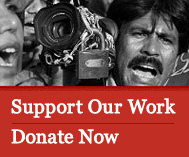DADA Goldberg visits CPJ

CPJ supporters Defne Aydintasbas (left) and Rebecca Goldberg Brodsky (right) are the Co-Founders of DADA Goldberg, a strategic public relations agency, which has grown to become the premier communications for the design field. In March, they visited CPJ’s New York headquarters at the John S. and James L. Knight Foundation Press Freedom Center with their team to learn more about our work. CPJ sat down with them to discuss that experience and why we are the company’s charity of choice.
CPJ: What motivates you to support journalists and press freedom?
Defne: We witness journalism to be under threat, both from an economic perspective in some of the western countries, and from democratic forces or lack thereof in the rest of the world. We feel that this is a field that requires all our attention because it’s so essential to a better world. This is why CPJ’s mission is just so, so important to us. Additionally, on a personal level, I’m from Turkey, so I have a sense of what happens when the press shrinks and what that does to society.
Rebecca: Of all the causes that could be supported in the world, the opportunity to be aware of the world is paramount to the success of each individual in this country. I’ve always found that democracy and journalism are intricately linked. I grew up believing in the American dream and wanting that for myself. I was in an isolated area of New York state at the time, so media was my entry point to the world. It’s linked to who I am as a human being. To be able to protect and preserve the institutions that uphold credible journalism is the most important thing that we could do.
CPJ: You brought your team to the CPJ office for a deep dive into our work. What aspects of our mission resonated with you, and why was it important for you to involve your entire team in this experience?
Defne: We work with a brilliant group of people who are at different parts of their career. Most are just starting out and gaining their footing in the world. We thought it was important for them to see the global context and understand newsmaking as a form of truth-telling—to understand the lengths to which journalists must suffer, and the challenges they face to fulfill that mission. In a way, it’s easy for us to think of ourselves completely removed from that because we’re not dealing with global or political news. So, I thought it was valuable for us to get to know the organization better. Before our visit, I thought of CPJ as an advocacy organization working with data, but I saw a hands-on operation with deep local community links. It was incredibly moving.
CPJ: In your view, why is press freedom crucial for a functioning society, and how do you see your support contributing to this cause?
Rebecca: I sincerely believe that all human beings are born with the same potential. Since education stops after a certain age, we all owe it to ourselves and each other to stay as current as possible and as worldly as possible. And I think that the only mechanism for continued self-education is journalism.
In some places, journalists are putting their lives on the line, dedicating themselves for the sake of humanity. There’s no greater cause that I could ever imagine backing.
Defne: We want the truth to be out there and for a system of checks and balances to be in place. If there’s a reason to fear the repercussions for what you write, that’s a really dangerous precedent.
CPJ: For someone reading this who also owns their own company, why do you believe integrating charitable giving into company culture is important?
Rebecca: Our choice to support CPJ was born out of the interest that Defne and I have with where the world is right now, and trying to predict the future because we live in a future state through public relations. We wanted to give back and create something that was more meaningful on behalf of our closest contacts and relationships. I would encourage others to look at donating specifically to CPJ for that reason. If you believe in being intentional with how you’re spending your time, resources, and energy and care about what you’re putting into the world, there’s no greater legacy that you could leave for either yourself or as a gift for someone else. You’re investing in the future by making sure that an entire global value system is protected.
The Power of Purposeful Giving: The Gold Family’s Story
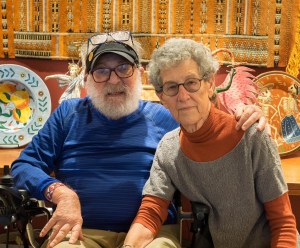
Barbara Gold, a pediatrician, and her husband Steve Gold, a disability rights lawyer, first became acquainted with CPJ when their son, Texas Monthly journalist Russell Gold, who was the chief energy reporter for The Wall Street Journal for 25 years, requested that they make a donation instead of giving him a birthday gift. The Gold family has a longstanding tradition of supporting charitable causes. As Barbara said, “We decided that gifts were just more consumerism […] we would say this is a much more important way to make the world a better place for your children and grandchildren than giving them another sweater they don’t like.”
Since their initial contribution, the Golds have remained steadfast supporters, advocating for press freedom among friends, family, and their condo community. In October 2023, Barbara delivered a well-received presentation on press freedom and CPJ’s mission to her community. Making the case for a free press in a world of deteriorating trust in the news can be difficult, yet Barbara felt it was important and believed her presentation may have instigated a shift in perspective among her friends.
As avid readers of newspapers since high school, the Golds value the impact of journalism, particularly in the current climate where accurate, vetted reporting is paramount. “People need to know the truth,” Barbara told CPJ, “They need to know what’s going on. [Journalism] is a check against false truths. I don’t know how you get that except from the press.”
With the 2024 U.S. election approaching, the Golds are deeply concerned about the proliferation of disinformation. Barbara emphasized the necessity of CPJ’s work in the coming years, “The need for CPJ in the next four years is going to be unbelievably crucial. It’s going to be crucial in any case, but once someone has clung onto disinformation they get from the internet, it’s impossible to change their mind. So, the work of free journalism, of investigative, unbiased journalism becomes literally lifesaving to our democracy.” The Golds describe their charitable giving as “focused.” Steve grew up blue-collar and Barbara was from a middle class family so they are thrilled to be in a position to make a difference through the organizations they invest in, with CPJ high on their list. Their commitment reflects a deep-seated belief in the power of everyone’s right to be informed: something that can only happen if the press can bring us the news safely and without fear of reprisal. As they continue to champion these values within their community and beyond, the Golds serve as inspiring examples of the profound impact individuals can have in nurturing a free and informed society.
Remembering Burl Osborne

Journalist and publisher Burl Osborne, who died in 2012, came from humble beginnings in the hills of Appalachia. Diagnosed at a young age with kidney disease, Osborne overcame a number of medical challenges to build a successful career as a journalist and a staunch defender of the free press.
Osborne began his career as a local Associated Press reporter in West Virginia whose stories gained national attention and later became the editor and publisher of The Dallas Morning News, as well as chair of the board of The Associated Press.
Osborne was also an early director of the board of CPJ and was integral to the creation of CPJ’s endowment fund, which continues to sustain our work and mission.
“Burl served on the board of CPJ for fifteen years,” former executive director Joel Simon says on the back cover of Osborne’s just-released biography. “He had an uncanny ability to identify the key issues, ask the relevant questions, and build a consensus around an informed decision. It was a marvel to watch him work.”
Those words were echoed by Paul Steiger, founding editor-in-chief, CEO, and former president of ProPublica–who served as the chair of CPJ’s board during Osborne’s tenure.
“I remember Burl with great affection, admiration, and respect,” Steiger told CPJ, “He was a terrific journalist and news executive, and a wise colleague whom I found to be a brilliant collaborator.”
In reflecting on the decade since Burl’s passing, Steiger cited his “marvelous knack for anticipating problems before they had a chance to emerge. When he spoke, everyone in the room listened.”
This year, following the 10th anniversary of Osborne’s death and the release of his biography by author Jane Wolfe, his wife Betty donated a special gift in memory of her late husband.
“There’s so much going on in the world where journalists are beat up, kicked around, criticized, kidnapped and killed,” Betty Osborne told CPJ. “Maybe some of the people who read Burl’s story will help try to change that attitude.”
That story, “Burl: Journalism Giant and Medical Trailblazer,” released on September 6 by Andrews McMeel Publishing, catalogs Osborne’s journalism career and his wisdom at a time when such acumen is needed to combat distrust of the media in the United States.
When Wolfe began writing the book, “terms such as ‘fake news’ and ‘alternative facts’ had come into the vernacular, and then-President Donald Trump was leading the charge against the media, calling reporters ‘corrupt liars’ and ‘the enemy of the people,’” Wolfe told CPJ.
“I wanted the people who were attending Trump rallies and attacking the press to know all about Burl, a paragon of integrity, the opposite of ‘the enemy of the people.’ He represented all that is good about reporters and editors and publishers. He was such a stickler for honesty, fairness, and accuracy.”
The world is better off because of that commitment to honesty, fairness, and accuracy–and with Betty’s wonderful gift in Osborne’s memory, his legacy of defending a free press will continue through our work.
WHYY-FM public radio makes generous contribution to CPJ

As Russia began its invasion of Ukraine in late February, Suzanne Fiske, the director of on air development at Philadelphia’s WHYY-FM public radio, wondered how the nonprofit could help.
“I think this has been such an upsetting and disturbing conflict,” Fiske remarked, “and it’s also a war of information. The journalists on the ground are the ones creating the record, and our audience was eager to know what was happening–that can only happen with journalists who have protection.”
When Fiske searched for a nonprofit that aligned with WHYY-FM’s mission of ensuring a free press and an informed democracy, she discovered CPJ and knew she’d found a match. In fact, the Philadelphia-based public radio had interviewed CPJ staff on at least three previous occasions while reporting on attacks and imprisonment of journalists globally.
Now, WHYY-FM could support journalists like them through CPJ. During their recent membership drive, WHYY-FM committed to contribute $3 to CPJ for every donation received. That resulted in more than $11,000 to support the Gene Roberts Fund for Emergency Assistance, which provides modest grants to journalists who are in need and qualify for assistance.
The emergency fund was renamed in 2014 to honor Gene Roberts, a veteran U.S. journalist and former chair of the CPJ board. For 18 years, Roberts was the executive editor of The Philadelphia Inquirer. The support from WHYY-FM will be used to help journalists like those covering the war in Ukraine–or even journalists in Russia.
“During our drive, there was news about Russia shutting down the free press and news of journalists getting hurt and killed, and it resonated with our audience, the importance of your organization,” Fiske told CPJ. In fact, as financial support came in, one listener told WHYY-FM, “I’m a sustaining member and also donate to CPJ; this is a win-win to support two organizations that keep us informed.”
We are truly grateful to have received this support from WHYY-FM and its listeners who care about a free press.
Sir Harold Evans: the model press freedom defender

Over the years, journalists from all over the world have joined CPJ’s mission to defend press freedom. Few have done so with the courage and tenacity of Sir Harold Evans, who died in late September 2020.
Sir Harold’s passion for journalism began at a young age, when he heard his father speak with survivors of the Battle of Dunkirk in World War II. He attended Durham University and worked as a journalist and editor for multiple outlets, including the Manchester Evening News, The Guardian, and The Sunday Times. His fierce journalism–that exposed injustice and corruption at the highest level–“blasted open some of the legal challenges to journalism” in the United Kingdom, according to Alan Rusbridger, CPJ board member and former editor of The Guardian. Facing prosecution under the Official Secrets Act for his reporting, as well as possible jail time, Sir Harold’s staunch commitment to press freedom ultimately changed the landscape for a functioning free press in the country. He went on to serve as the president of Random House, founded Condé Nast Traveler, and became Editor at Large for Reuters.
Sir Harold was a friend to press freedom beyond the U.K. as well, co-authoring The Freedom of the Press: The Half-free Press, with Washington Post publisher Katharine Graham. He served as co-chair of CPJ’s 1998 International Press Freedom Awards. In 2014, Sir Harold helped set up a meeting between CPJ and Turkish president Recep Tayyip Erdogan during CPJ’s mission there. For his dedication to safeguarding journalists and journalism, CPJ could not be more grateful.
Sir Harold’s friends, family, and former colleagues are continuing his legacy with significant memorial contributions toward CPJ’s work. We are so grateful for their support–and for his.
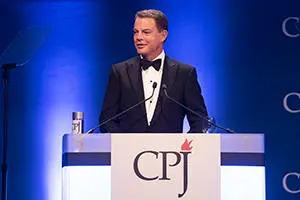
CPJ hosted its 2019 International Press Freedom Awards dinner in November, which raised more than $2.7 million for our work, a new record! During the dinner, host Shep Smith made a surprise announcement–he was personally donating $500,000 to CPJ!
Smith spoke passionately about the need for a free press. “Journalists are sometimes wary of being perceived as activists for some cause, but press freedom is not the preserve of one political group or one political party,” he said. “It’s a value embedded in our very foundational documents. Journalists need to join hands to defend it.”
The dinner was chaired by Laurene Powell Jobs and Peter Lattman of the Emerson Collective and included an appeal that was matched by the John S. and James L. Knight Foundation.
Photo by Barbara Nitke
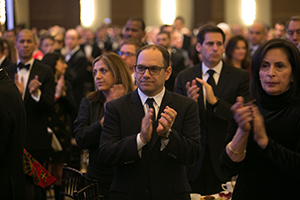
In a special appeal during CPJ’s 2017 International Press Freedom Awards dinner, Christiane Amanpour, chief international correspondent for CNN and the host of the evening, called on guests to make a gift to CPJ. All donations made during the night, she announced, would be matched dollar for dollar by the John S. and James L. Knight Foundation.
Actor and activist Meryl Streep was among the CPJ supporters whose gift was matched by the Knight Foundation. The dinner raised nearly $2 million for CPJ, support that will enable our organization to continue defending journalists and upholding press freedom all over the world.
At the dinner, CPJ honored four journalists from Cameroon, Mexico, Thailand, and Yemen who have faced threats, imprisonment, and exile for reporting the news.
Photo by Getty Images/Kevin Hagen.
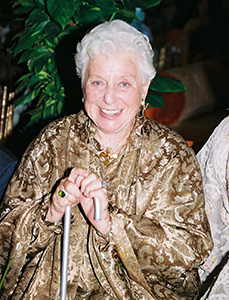
In early 2017, the Patti and Everett B. Birch Foundation made a generous grant to CPJ to honor the legacy of Patti Cadby Birch and her lifelong commitment to freedom of speech, freedom of the press, and the strengthening of democratic institutions.
The grant came from funds bequeathed by Birch, who died in 2007. She was also a generous supporter of the arts and was a longtime honorary trustee of both the Metropolitan Museum and the Museum of Modern Art in New York. She and her husband, Everett, who died in 1987, made significant donations of art and funding over the years.
In honor of Birch’s legacy, CPJ is establishing a Patti Birch Fellowship Program. Over the next five years, CPJ will hire 10 Patti Birch Fellows who will each identify and carry out a supervised independent project on various thematic issues. Each fellowship will be a one-year paid position.
As Meryl Streep accepted the Cecil B. DeMille Award at the 2017 Golden Globes ceremony on January 8, 2017, she called on the audience and the broader community to join her in supporting CPJ. You can #StandWithStreep and click here to make a donation.
In her speech, Streep said, “Disrespect invites disrespect, violence incites violence. And when the powerful use their position to bully others, we all lose. … We need the principled press to hold power to account. That’s why our founders enshrined the press and its freedoms in the Constitution.”
So, Streep continued, “I only ask … all of us in our community to join me in supporting the Committee to Protect Journalists, because we’re going to need them going forward, and they’ll need us to safeguard the truth.”
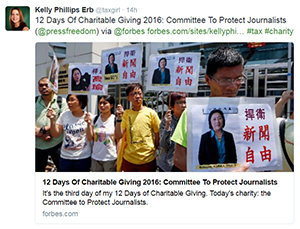
Over a few weeks in December 2016, readers of Forbes magazine suggested charities deserving of support. Forbes staff writer Kelly Phillips Erb compiled the suggestions and published a list of a dozen organizations over what she called “the 12 Days of Charitable Giving.”
On December 20, the third day, Forbes listed CPJ as the charity of the day!
CPJ was founded 35 years ago by a group of U.S. journalists who realized they could not ignore the plight of colleagues whose reporting put them in peril on a daily basis. To protect journalists globally, the Forbes article said, CPJ documents cases of press freedom violations, publishes reports, conducts high-level advocacy, and provides “individual moral and material support.”
CPJ, the story continued, “believes that information is power.”
Read the Forbes article here.
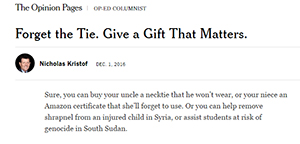
In early December 2016, New York Times columnist Nicholas Kristof presented his annual holiday gift list. But this year’s list, he said, “is special.”
In his column, called “Forget the Tie. Give a Gift That Matters,” Kristof calls on his readers to support CPJ, an organization that, he says, “speaks up for imprisoned journalists worldwide and tries to end impunity for those who murder journalists.”
That we do. For 35 years, CPJ has worked hard to uphold press freedom all over the world. Our advocacy has helped spring journalists from prison, win convictions in journalist murders, and secure positive legal reforms.
Read Kristof’s column here.
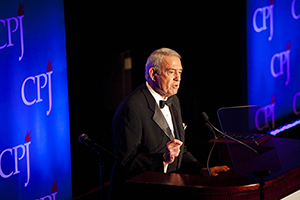
In his more than 60 years of reporting the news, Dan Rather has remained a champion of watchdog journalism. The former anchor and managing editor of “The CBS Evening News” and correspondent for “60 Minutes” has received virtually every honor in broadcast journalism.
He was also one of CPJ’s earliest supporters. Rather served on CPJ’s board of directors for nearly 30 years and, in 2011, began serving CPJ as a senior adviser.
Rather’s December 2015 book, called Lessons from the field: Everything I learned about life I learned from reporting, is being sold exclusively by the MindBodyNetwork, an online self-help community of experts in health and wellness. All the proceeds from his book are donated to CPJ.
We spoke to Rather about CPJ’s early years and the importance of press freedom. “A free and independent press–fiercely independent, if necessary–is the red beating heart of freedom and democracy,” he said. “It’s one reason I’m so happy to still be involved as I can with CPJ, because that was the heart of founding CPJ.”
Read our Q&A with Rather here.
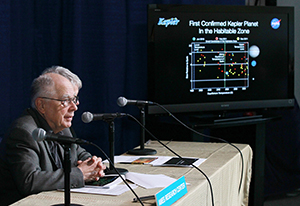
Dr. William Borucki, the former principal investigator of NASA’s Kepler Mission, donated to CPJ part of the Shaw Prize in Astronomy he was awarded in June 2015.
Borucki, who spent more than five decades at NASA, advocated for years to develop a space mission that could detect Earth-size planets and determine the frequency of those planets in the habitable zone of sun-like stars. The Kepler Mission was launched in 2009 and has confirmed more than 1,000 planets.
We spoke to Borucki about the importance of press freedom and why he chose to support CPJ. “My wife and I hunted around for an organization that actively supported journalists in their efforts to get at the facts, especially in difficult circumstances,” he told us. “Your organization best fit that criterion.”
Read our interview with Borucki here.
CPJ’s International Program Network was initially launched with an endowed gift from Bloomberg.
Our growing team of on-the-ground consultants and stringers helps CPJ respond in real time to press freedom emergencies around the world. Working closely with the program staff at CPJ’s headquarters in New York, the International Program Network advances our mission of promoting global press freedom by improving our ability to report and investigate attacks on journalists, strengthening CPJ’s alliances with local and regional press freedom advocacy groups, enabling more timely direct assistance to journalists under threat, and meeting with local and international authorities to advocate for press safety.
Whether responding to a crisis or lending context to a regional threat, this network of experienced reporters and regional analysts has provided invaluable support to CPJ’s work. Read more about them here.
